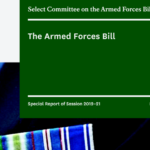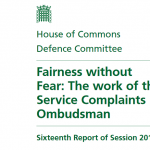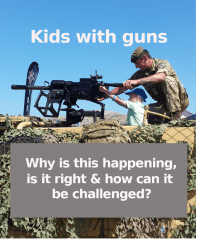The UK is the only country in Europe that recruits 16 year olds into the armed forces and currently one quarter of British Army recruits are under 18. Much of our early work focused on campaigning to raise the minimum age of recruitment to 18 years.
Concerns about the way that young people are not supported to make an informed choice about enlistment – and the consequences of this – were at the heart of our decision to set up ForcesWatch. The armed forces target recruitment activities at children and teenagers, and are involved in the education system and youth organisations and visible in many online and gaming platforms. Military life is promoted in a sanitised and glamourised way, without concern for the risks and ethical questions it poses.
Research over the last 15 years has indicated again and again that military environments are not suitable for those under the age of 18. Even though personnel are not deployed until they are adults, they face significant risks during training. Many drop out before completing training or after very short careers, and often face further difficulties. Youth and pre-existing vulnerabilities can make the impact much greater than for older recruits. They, and all armed forces personnel, face restrictive terms and conditions of service. Military institutions are not adequately accountable in relation to their duty of care for individuals within them, and there are high levels of bullying, harassment and assault. The military justice system often exacerbates the harmful impact and the limited reforms that have been implemented have yet to address the scale of the problem.
We continue to monitor recruitment practices – including military marketing – and the wider politics and culture around recruitment to the armed forces.
We support the work of partner organisations to highlight concerns and risks, and to ask questions about the ethics of armed forces recruitment practices and the moral impact of military service.
Child Rights International Network (CRIN) are leading the campaign to raise the age of recruitment into the UK armed forces. You can find their briefings, reports and other materials here.
If you are thinking of joining the armed forces – or you know someone who is – Before You Sign Up is a valuable resource for information and questions. See more resources here.
Useful resources
Soldiers at 16: Sifting fact from fiction
 Published by Child Soldiers International, this short and accessible booklet addresses questions often raised about under-18s in the armed forces, presenting the facts - based on extensive research - rather than the fiction. Also contains very useful quotes and statistics. Great when talking to your MP or for those thinking of enlisting!
Published by Child Soldiers International, this short and accessible booklet addresses questions often raised about under-18s in the armed forces, presenting the facts - based on extensive research - rather than the fiction. Also contains very useful quotes and statistics. Great when talking to your MP or for those thinking of enlisting!
The British armed forces: Why parental consent safeguards are inadequate
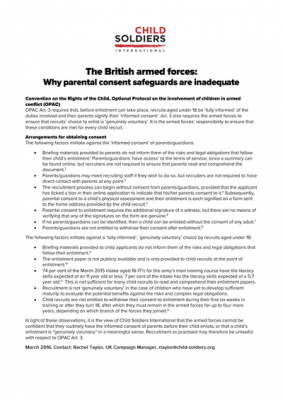 This briefing from Child Soldiers International explains why the armed forces cannot be confident that they routinely have the informed consent of parents before their child enlists, or that a child’s enlistment is “genuinely voluntary” in a meaningful sense.
This briefing from Child Soldiers International explains why the armed forces cannot be confident that they routinely have the informed consent of parents before their child enlists, or that a child’s enlistment is “genuinely voluntary” in a meaningful sense.
‘Commonsense and Understanding’: Recommendations from the Defence Committee’s Duty of Care report that are still outstanding 10 years on
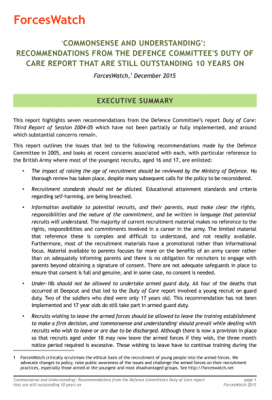 This report highlights seven recommendations from the Defence Committee’s report Duty of Care: Third Report of Session 2004-05 which have not been partially or fully implemented, and around which substantial concerns remain.
This report highlights seven recommendations from the Defence Committee’s report Duty of Care: Third Report of Session 2004-05 which have not been partially or fully implemented, and around which substantial concerns remain.
This report then discusses the concept of 'in loco parentis' and 'moral obligation' with regard to the army's duty of care towards young recruits, noting that the Defence Committee were concerned in 2005 that the MoD distinguished too rigidly between legal and moral obligations, with the latter as less important.
In 2005, the Defence Committee discussed the lack of balance beween training needs and considerations for operational effectiveness, and thus made its recommendations. Ten years on, it is apparent that operational arguments, and current difficulties meeting recruiting targets, continue to prevent the armed forces from reviewing both their position on enlisting under-18s, and their recruitment practices and materials.
Concerns about armed forces visits to secondary schools in Wales
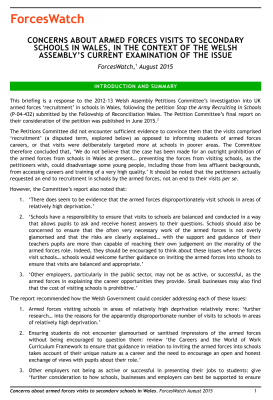 This briefing is a response to the 2012-13 Welsh Assembly Petitions Committee’s investigation into UK armed forces ‘recruitment’ in schools in Wales, following the petition Stop the Army Recruiting in Schools (P-04-432) submitted by the Fellowship of Reconciliation Wales. The Petition Committee’s final report on their consideration of the petition was published in June 2015.
This briefing is a response to the 2012-13 Welsh Assembly Petitions Committee’s investigation into UK armed forces ‘recruitment’ in schools in Wales, following the petition Stop the Army Recruiting in Schools (P-04-432) submitted by the Fellowship of Reconciliation Wales. The Petition Committee’s final report on their consideration of the petition was published in June 2015.
UK’s compliance with the UN Convention on the Rights of the Child: Report from the Joint Committee on Human Rights
Army Recruitment: Comparative cost-effectiveness of recruiting from age 16 versus age 18
 This paper, published by ForcesWatch and Child Soldiers International, shows that the taxpayer would save approximately £50 million per annum if the minimum age of recruitment were raised to 18; it would also result in the army needing to find about 211 fewer new recruits annually, based on current numbers joining the trained strength.
The paper concludes that the case to cease recruiting from age 16 is now overwhelming and urges a full, independent review of the policy, with a view to phasing out the recruitment of minors as an unnecessary, cost-ineffective, and fundamentally unethical practice.
This paper, published by ForcesWatch and Child Soldiers International, shows that the taxpayer would save approximately £50 million per annum if the minimum age of recruitment were raised to 18; it would also result in the army needing to find about 211 fewer new recruits annually, based on current numbers joining the trained strength.
The paper concludes that the case to cease recruiting from age 16 is now overwhelming and urges a full, independent review of the policy, with a view to phasing out the recruitment of minors as an unnecessary, cost-ineffective, and fundamentally unethical practice.
Camouflage Kids: How the military affects young people’s lives
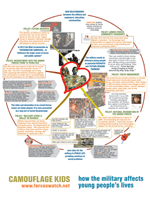 A ForcesWatch poster showing policy, cultural and other recent developments affecting the extent of military influence in young people's lives.
A ForcesWatch poster showing policy, cultural and other recent developments affecting the extent of military influence in young people's lives.
The Last Ambush? Aspects of mental health in the British armed forces
 This report from ForcesWatch, shows that young soldiers recruited from disadvantaged backgrounds are substantially more likely than other troops to return from war experiencing problems with their mental health. It calls for the policy of recruiting from age 16 to be reviewed so that the greatest burden of risk is not left to the youngest, most vulnerable recruits to shoulder.
This report from ForcesWatch, shows that young soldiers recruited from disadvantaged backgrounds are substantially more likely than other troops to return from war experiencing problems with their mental health. It calls for the policy of recruiting from age 16 to be reviewed so that the greatest burden of risk is not left to the youngest, most vulnerable recruits to shoulder.
‘Catch them young before the army loses them’
 by David Gee in Sowing Seeds: The Militarisation of Youth and How to Counter It, War Resisters International, 2013
by David Gee in Sowing Seeds: The Militarisation of Youth and How to Counter It, War Resisters International, 2013








